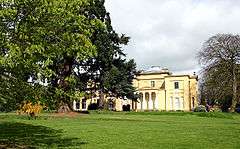British Horological Institute
The British Horological Institute (also known as the BHI) is the representative body of the horological industry in the United Kingdom.
History
The BHI was founded in 1858 by a small group of clockmakers, one of whom was Edward Daniel Johnson. [1] Their aim was to unify the British horological industry and trades in the face of large numbers of imports of clocks and watches from abroad. The Institute was an immediate success and within a year it had founded its own museum and library; it also began to offer evening classes in clock- and watch-making.[1]
The journal of the Institute is the Horological Journal, which has been published monthly since September 1858.[2]
The BHI today
The current premises of the BHI are at Upton Hall in Nottinghamshire, England. Its primary role is that of education, providing a standardised set of examinations for training horologists.[1] It also maintains a list of members whom it considers sufficiently qualified to repair clocks and watches, and who adhere to a strict code of practice. It publishes the Horological Journal monthly, the oldest continuously-published technical journal in the world. It contains details of anything and everything relevant to horology and horologists. Upton Hall is also home to the charitable Museum of Timekeeping at the British Horological Institute, which includes the original BHI Museum and Library.
Membership
The Institute offers a number of different kinds of membership. These include:
- Associate Membership
- Any individual with an interest in horology may subscribe as a member
- Full Membership
- Full membership is open to graduate members with a sufficient degree of professional experience as a watchmaker or clockmaker. Full members may append the letters "MBHI" to their name.
- Fellowship
- In order to become a fellow of the BHI, one must make a contribution to the field of horology deemed to be of exceptional value. (This has not always been the case; it was significantly easier to gain fellowship in latter half of the twentieth century.)
Fellows of the BHI are entitled to append the post-nominal letters "FBHI" to their name.
A full explanation of the different grades of membership is available on the BHI's own website.
Museum of Timekeeping
The Museum of Timekeeping is also housed at the home of the British Horological Institute.
The Museum of Timekeeping is an independent charitable Museum (Registered Charity Number 1176495), established in 1994 to hold in trust the collection and library, brought together by BHI members since its founding in 1858.
The Museum includes a collection of clocks, watches and timepieces and associated clock and watch making tools and ephemera. It can be visited during seasonal opening hours, plus a range of special events, or by booking a private group visit.
The Museum of Timekeeping Library is one of very few existing specialised libraries dealing primarily with horology. It is open to researchers by appointment, and its holding includes a number of rare documents, papers, letters and books, particularly dealing with the high points of British horology in the 18th and early 19th century, but its catalogue contains comparatively few titles published in the last several decades.
You can visit the museum’s website at www.museumoftimekeeping.org.uk
BHI Gold Medal
The institute's gold medal for an outstanding contribution to horology has been awarded to:
- 1928 Frank Watson Dyson - Astronomer Royal who introduced Greenwich pips.
- 1930 Charles Édouard Guillaume - developed Invar and Elinvar
- 1946 Frank Hope-Jones (1867–1950) - developed electrical timekeeping, including Synchronome system
- 1947 Rupert Gould - restored John Harrison's chronometer
- 1947 Warren Alvin Marrison - developed the quartz crystal clock
- 1948 Harold Spencer Jones - Astronomer Royal
- 1957 John Harwood - invented the self-winding wristwatch
- 1981 George Daniels - developed the co-axial escapement now used by Omega watch company.
See also
- Upton Hall - the headquarters of the BHI.
References
- 1 2 3 BHI official website
- ↑ "Horological Journal". British Horological Institute. Retrieved 2009-09-08.
Www.museumoftimekeeping.org.uk
